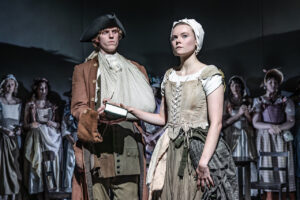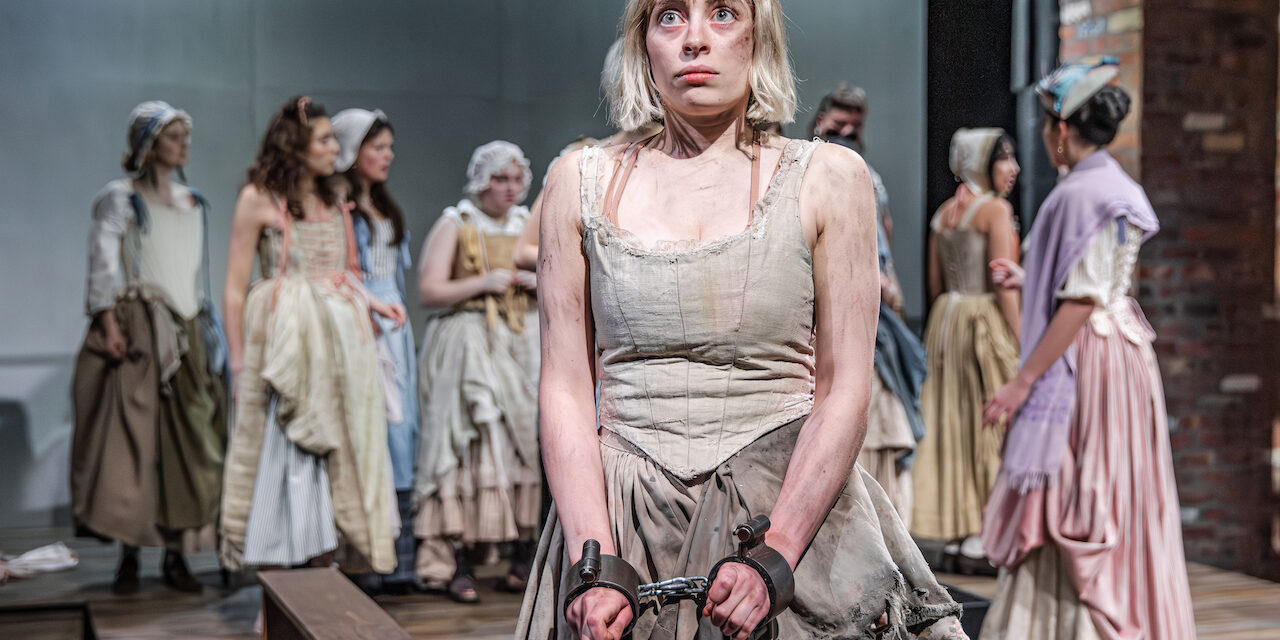
9 – 16 November
The Welkin is an ambitious play which takes a multi-layered approach to its theme, perhaps best summed up in the line, ‘Nobody blames God when there is a woman to blame instead.’ The welkin is an old term for the sky, or the vault of heaven, and for writer Lucy Kirkwood it represents everything that has traditionally been denied to women, earthbound by the drudgery of home-making and child rearing. Directed by Emma Callander, the play opens with twelve women busy at domestic tasks. As they sweep the floor, hang out the washing or churn the butter they sing of a land where they would be free of such endless, repetitive labour. But these women are to be temporarily taken away from their chores, for they are to serve on a jury where they will decide whether another woman will hang or be deported. In the 18th century a woman found guilty of a capital offence could not be hung if it was shown that she was pregnant, and this jury of twelve matrons are convened to determine if this is the case.
So far, so like 12 Angry Men, but Kirkwood has created something far more than a straightforward debate about guilt or innocence. All her main characters are complex, flawed beings, and the play features quite startling shifts in mood. There is gut-wrenching bloody violence, but also robust comedy. This creates a pervading uneasiness about where one’s sympathies should lie, or even about how one should be responding emotionally. That ambiguity is seen most clearly in the character of Sally Poppy, the woman accused of child murder who may or may not be pregnant. In a brave, magnetic performance Lotte Pearl shows her to be a noisily confrontational, vulgar and unrepentant wretch, yet also someone capable of love and deserving of sympathy. Similar complexity is found in the character of Lizzy Luke, the midwife who is most keen to save Sally from the gallows.

In a commanding performance that forms the moral core of the play, Ellie Spooner conveys Lizzy’s passionate, urgent determination to persuade her fellow jurists that this situation presents a rare opportunity for women to assert some authority in a male-dominated world. That chance for sisterhood to express itself seems more important to Lizzy than whether Sally is truly pregnant.
There is not space to mention all the cast individually, but Emily Hurst is particularly memorable as Mary Middleton, an earthy, pragmatic farmer’s wife who will be in trouble at home if she fails to get back to pick their crop of leeks before sundown. Memorable too is Spike Maxwell as Judith Brewer, the woman who finds the confines of the courtroom hot and oppressive, but who on opening the window reveals the baying, gallows-hungry mob outside.
We see the twelve women interacting in ways that reveal both their different characters and the complicated relationship that they have with a society that has in so many ways rendered them inferior. They mercilessly tease the only man in the courtroom, a court official (Oscar Gough), but some of them would far prefer a male doctor to be making the judgement call than midwife Lizzy. In these ensemble sequences they vividly bring their disparate characters to life, creating a vibrant portrait of womanhood.
Yet I have reservations regarding the play itself. It is overlong, and has most certainly made its chief arguments with half an hour to spare. The second half features sudden shifts in time and mood that are distracting and distancing. Kirkwood is undoubtedly a talented writer, but The Welkin needs editing.
★★★☆☆ Mike Whitton, 10 November 2024
Photo credit: Craig Fuller


